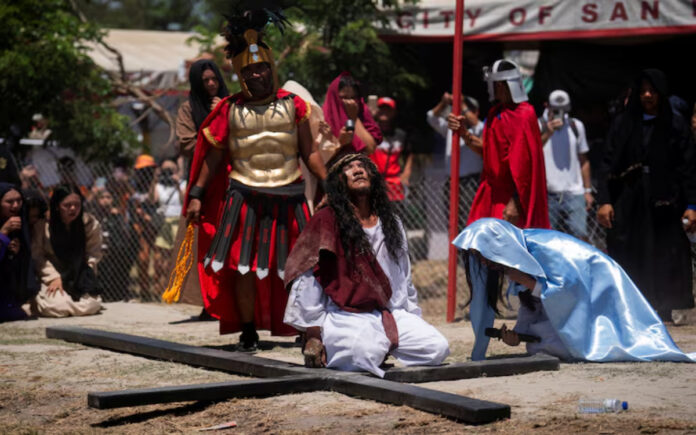San Fernando: In a dramatic expression of faith, Christian devotees in the Philippines were nailed to wooden crosses on Friday in a re-enactment of Jesus Christ’s crucifixion—part of an annual ritual observed during Holy Week in this predominantly Catholic country.
Thousands of local worshippers and foreign visitors gathered in San Pedro Cutud, a village in Pampanga province north of Manila, to witness the highly anticipated spectacle. Among the participants was 64-year-old Ruben Enaje, who portrayed Jesus Christ for the 36th time, continuing a personal tradition he began decades ago after surviving a life-threatening accident.
Enaje, along with two other devotees, was hoisted onto a wooden cross after actors dressed as Roman soldiers hammered two-inch nails into their palms. While ropes and cloth supported their weight, the physical toll was evident.
“The first five seconds were very painful. As time goes and the blood goes down, the pain numbs and I can stay on the cross longer,” Enaje said in an interview after the re-enactment.
The Good Friday ritual is one of the most graphic public displays of Catholic devotion in the Philippines, a country where nearly 80% of the 110 million population identify as Roman Catholic. It is part of the wider observance of Holy Week, a sacred period that spans Palm Sunday to Easter Sunday, commemorating the final days of Christ.
Also Read | Trump Warns US May Exit Ukraine-Russia Talks Without Progress
Aside from crucifixion re-enactments, some penitents also engage in self-flagellation during Holy Week, walking barefoot through village streets while whipping their backs with bamboo rods until blood is drawn—an act meant to symbolize penance and sacrifice.
Despite its popularity, the Catholic Church in the Philippines has long discouraged these forms of extreme devotion. Church leaders continue to urge the faithful to focus on prayer, reflection, and genuine repentance, emphasizing that such rituals are not necessary to honor Christ’s suffering.
Also Read | Denmark Plans Military Training Mission in Ukraine; Russia Promises No Immunity
However, for many, these acts remain a deeply personal way of expressing faith and seeking spiritual cleansing during Lent.



